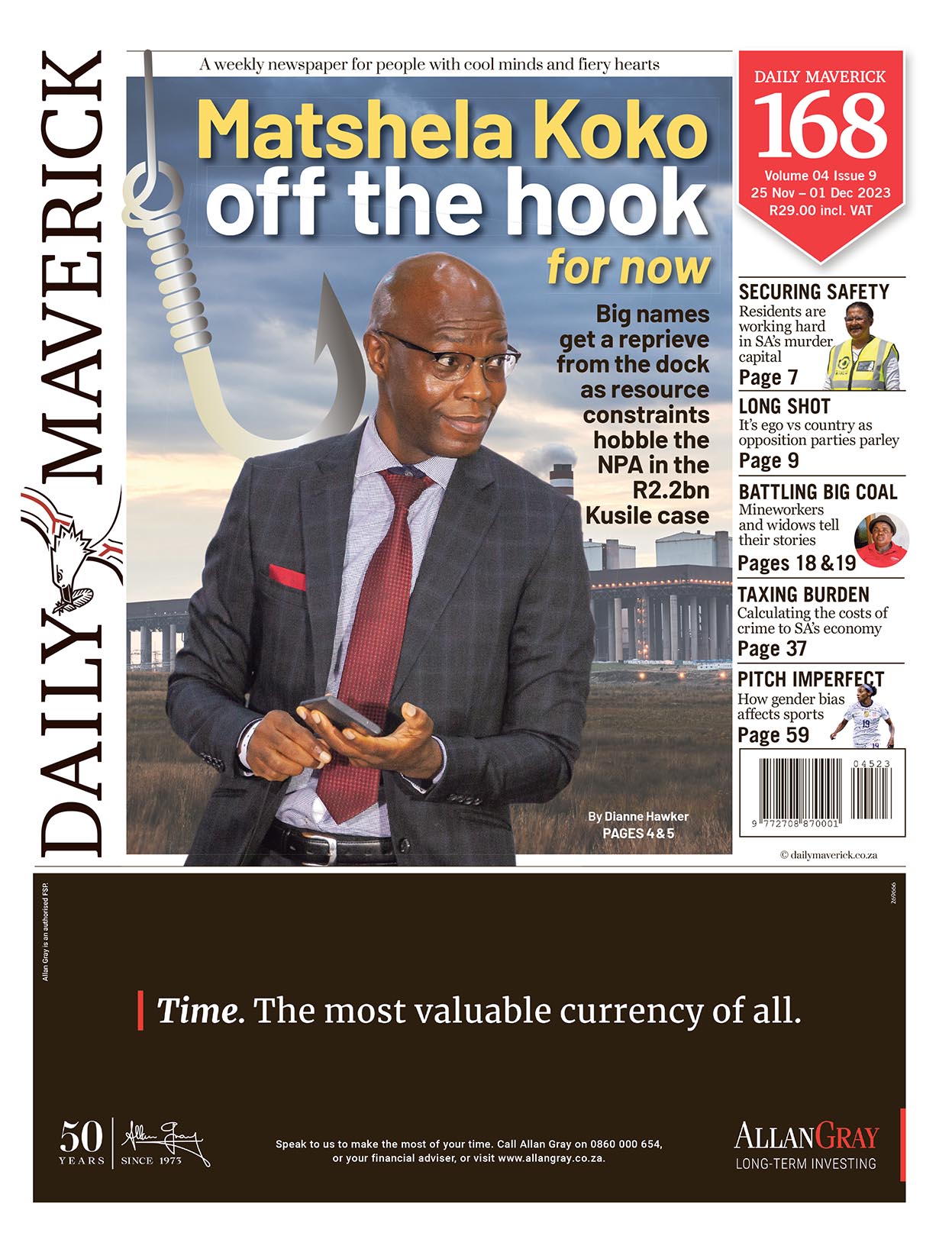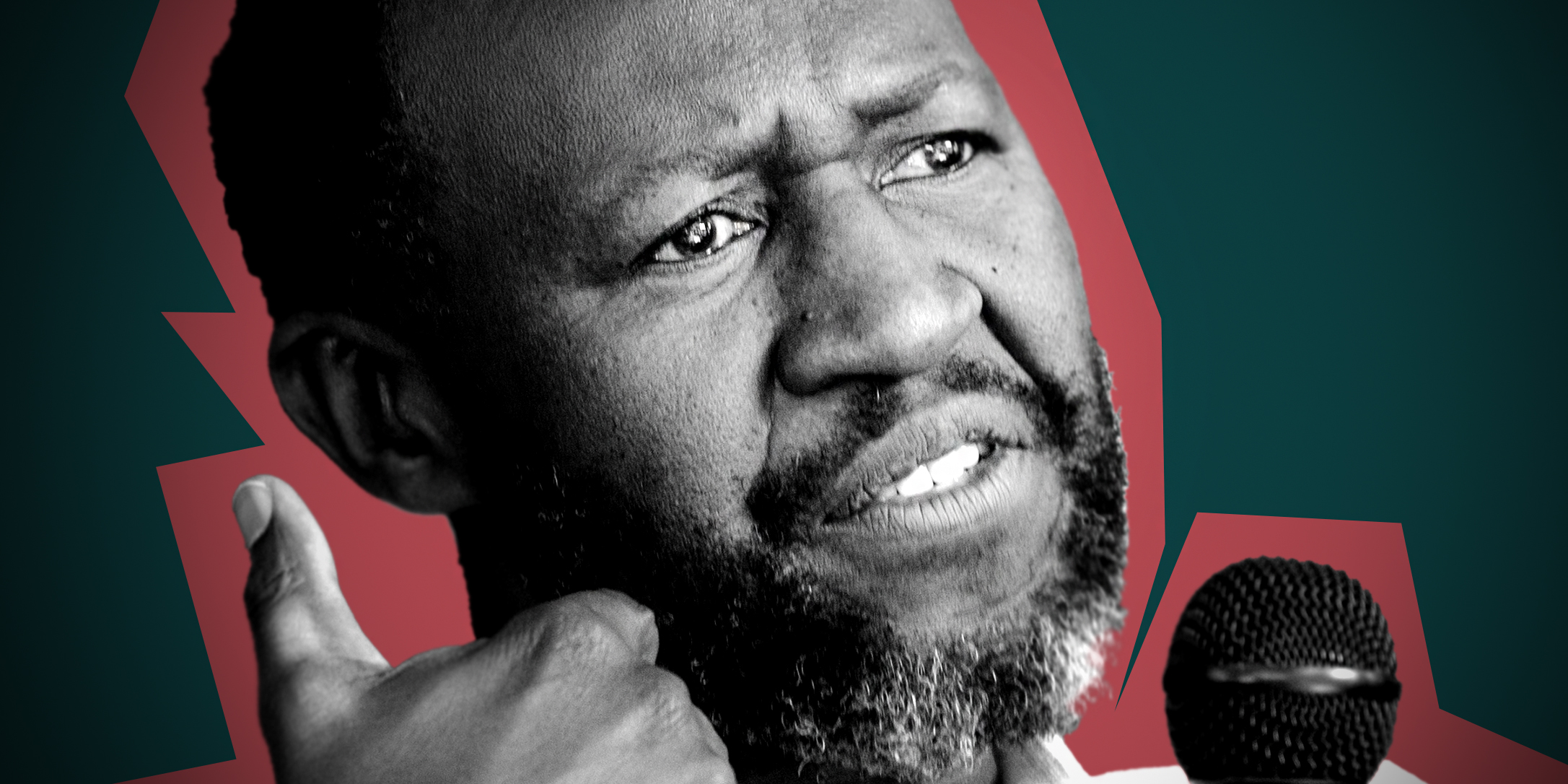How do you get eight men possessing sizeable political egos to put aside their individual interests and come together for the greater good?
That is the unenviable task faced by Professor William Mervyn Gumede in his capacity as the independent chair and chief negotiator of the Multi-Party Charter, the coalition of eight opposition parties intending to pool votes in the 2024 general elections in the hope of toppling the ANC.
Their political project is a first for South Africa. It is also a long shot – but a shot, Gumede insists, worth taking.
He understands sceptics of the idea, because he used to be one. Indeed, he says he probably would not have accepted the job of chairing the Multi-Party Charter were it not for a punishing and frightening battle with Stage 4 bone cancer. Gumede came out of five years of chemotherapy in late 2022.
“It changes your life, and it changes the decisions you make,” Gumede told Daily Maverick in an interview this week.
“If I didn’t have this cancer journey, I don’t think I would have taken [the Multi-Party Charter job] on. I would have worried about my reputation, the backlash…”
It’s hard to imagine a better candidate for this most difficult of roles than Gumede, of whom people sometimes speak as a future presidential candidate himself. One of South Africa’s leading academics, Gumede is in demand internationally for his mediation work and his guidance on ethical governance.
When I was initially approached, I was extremely sceptical at the time that opposition parties would have the maturity to come together and fight an effective campaign.
He has had to bring every bit of his experience to bear on his work for the Multi-Party Charter, where he must persuade the leaders of eight different parties to reach consensus on complex matters. To make his task more difficult, these men – and they are all men, Gumede acknowledges with significant regret – in some cases have personal beef.
Perhaps most notable have been the past tensions between ActionSA’s leader, Herman Mashaba, and DA leader John Steenhuisen. Mashaba left the DA in 2019 in anger over the party’s handling of race and inequality. Steenhuisen would subsequently accuse Mashaba of having failed the people of Johannesburg during his stint as mayor by pandering to the EFF, in response to which Mashaba would threaten legal action against Steenhuisen.
Faced with the prospect of having to manage dynamics of this kind within the leadership group, little wonder that Gumede initially baulked at the prospect.
“When I was initially approached, I was extremely sceptical at the time that opposition parties would have the maturity to come together and fight an effective campaign. There is a maturity deficit in South African politics,” Gumede says.
What persuaded him to take on the role nevertheless was his conviction that the Multi-Party Charter project could be transformative for South Africa.
Gumede points to the fact that this kind of pre-election coalition agreement has been very effective in similar contexts in the developing world, particularly in political situations where there is either “a really strong ruling party or a military dictator”, he says.
“In those circumstances, one [opposition] party on its own is not going to win an election.”
How, then, has Gumede been able to herd eight political cats into signing a historic coalition agreement?
He has not been scared to use therapeutic techniques, bringing in coaches to encourage the leaders to be vulnerable in front of each other and to open up in front of the group.
Meditation and hugs
Gumede has introduced the group to breath work and meditation – and in some cases, he says, simply “got them to hug each other”. He also starts every negotiation session with a prayer “speaking to what they need to do and how they need to rise above”.
The text of the prayer, seen by Daily Maverick, reads in part:
“There are pivotal moments in history, whether for a country or in an individual’s life, where the decisions made may change the future forever… These decisions have the power to perpetuate the country’s downward trajectory for generations to come, or it can unleash a wave of momentum, ushering in positive change for our children and future generations. Therefore, Lord, please open our hearts to work together. Teach us true humility. Grant us the maturity to rise above our egos, for the greater good of South Africa.”
Looking at data from around the world, change in societies from an economic prosperity point of view can only come when there is greater gender equality.
The fact that all eight leaders are men remains a sore spot for Gumede – partly because he feels negotiations run more smoothly with women in the room: “Women are more likely in conflict situations to come up with imaginative solutions,” he believes.
But Gumede also points to research elsewhere suggesting that women’s votes could be particularly critical in the 2024 elections, because men are more likely to vote along “misguidedly loyal” lines, or cast what Gumede terms “trauma-bonding votes” because they are based on the past.
More generally, it is the academic’s firm conviction that South Africa will not thrive in any true sense until gender equality takes root in a more entrenched manner.
“Looking at data from around the world, change in societies from an economic prosperity point of view can only come when there is greater gender equality.
“Even in China: after the Cultural Revolution, they opened up the space for women economically and socially. The success of the postwar welfare state in Europe had a lot to do with the change in gender dynamics as a result of the war.”
Gumede concludes: “If we want to turn around South Africa, we really have to break the patriarchy.”
Competition set aside
Eight parties that have traditionally been in heated competition are now working on a set of broad policies to be presented to the public as their vision for governance if they win a majority of the 2024 vote together and take power as a coalition.
Although the DA is by far the biggest party in the Multi-Party Charter, Gumede is adamant that no one party can dominate the proceedings.
“One of the reasons coalitions fail is that big parties often demand the lion’s share, and that’s not how coalitions work. Maturity in a coalition means there must be tactical concessions. The main goal is to win an election, and everything else has to be put aside.”
Read more in Daily Maverick: How the Multi-Party Charter could make history at the 2024 polls
The parties represented in the Multi-Party Charter represent a fairly diverse group of constituencies – from conservative Afrikaans voters (Freedom Front Plus) to some portion of the black middle class (ActionSA) – but there is a still a concern about whether they can appeal to a sufficiently broad base of voters to bring home the numbers needed.
Gumede says everything is up for grabs in the election: “27 million voters didn’t vote last time. There is an abundance of votes.”
Much may come down to what parties can offer black youth. The Electoral Commission of South Africa has revealed that its first voter registration weekend, held this month, saw 78.31% of new voter registrations coming from the age group between 18 and 29.
The assumption is that a swell in younger black voters will benefit the EFF. Gumede feels it will be critical for the Multi-Party Charter to develop a coherent and attractive campaign offering for young people.
This is, he says, a genuine tipping point for South African democracy: a moment, which may not come again, when things can still be clawed back. Gumede reports that since he took on the Multi-Party Charter role, the response from the public has been overwhelmingly: “Please make this work.”
Asked if Gumede himself intends to vote in 2024, he almost falls off his chair.
“We all have to vote!” he roars.
Parties signed up to the Multi-Party Charter so far
Democratic Alliance, Inkatha Freedom Party, Freedom Front Plus, ActionSA, Spectrum National Party, United Independent Movement, Independent South African National Civic Organisation, African Christian Democratic Party. DM






 Professor William Gumede in Stellenbosch on 10 October 2023. (Photo: Gallo Images / Die Burger / Jaco Marais)
Professor William Gumede in Stellenbosch on 10 October 2023. (Photo: Gallo Images / Die Burger / Jaco Marais)